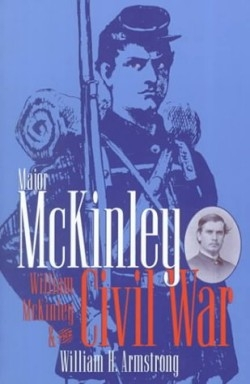
Major McKinley
William McKinley and the Civil War
Theodore Roosevelt accused President McKinley of having “no more backbone than a chocolate éclair” because he viewed the President as being overly cautious about committing American troops to war with Spain. Yet, as Armstrong, a retired United Church of Christ minister, demonstrates in this lucid and carefully researched account of McKinley’s service during the Civil War, he was anything but cowardly. McKinley was such an ardent Union supporter that he enlisted in 1861, when he was barely eighteen.
The author effectively uses primary documents, especially newspapers—McKinley, himself, was a war correspondent for the Mahoning Sentinel while a soldier, until President Lincoln issued a gag order on all such reporters—and McKinley’s personal diary to show the perils and terrible conditions that Union and Confederate troops endured. He initially served under Rutherford B. Hayes, another Ohioan and future President. Hayes was immediately impressed by the young soldier “… who had unusual character… Young as he was… McKinley was of rare capacity, especially for a boy his age.”
Although McKinley was not a rifle-carrying infantryman, he received medals for bravery at the Battle of Antietam, the bloodiest battle ever fought on American soil, and during the Shenadoah campaign towards the end of the war. He served primarily as a quartermaster and commissary sergeant, responsible for supplying thousands of troops with clothing, tents, stoves, fuel, wagons, horses, mules, etc. Acquiring these supplies required dangerous foraging missions through land inhabited by bushwhackers (guerillas and mercenaries) and Confederate sympathizers, dangers not unlike those faced by American troops in Vietnam. In addition to his medals, McKinley was promoted to major when he was twenty-two, one year after he was old enough to vote for president.
Armstrong devotes much attention to McKinley’s anti-slavery, pro-African American views. McKinley recognized the contributions to the Union of black soldiers and former and escaped slaves. Following the war, when he was a congressman and governor of Ohio, he strongly promoted the rights of African Americans and veterans. President McKinley, however, believed that the most important national priority was the reconciliation between the North and the South. Regrettably, this meant that the rights of blacks became a lesser priority. McKinley, Armstrong notes, had the misfortune of serving as president during the 1890s, the nadir of civil rights, when an average of 111 blacks were lynched each year.
In 1901, McKinley was assassinated and Theodore Roosevelt became President. McKinley received a soldier’s and statesman’s funeral, mourned by thousands of citizens and fellow veterans. He was remembered for his bravery and distinguished service. Soon after his election as President, a longtime friend asked McKinley what he would like to be called, since he had known him as congressman, governor and now President. McKinley said, “Call me Major. I earned that. I’m not sure about the rest.”
Reviewed by
Karl Helicher
Disclosure: This article is not an endorsement, but a review. The publisher of this book provided free copies of the book to have their book reviewed by a professional reviewer. No fee was paid by the publisher for this review. Foreword Reviews only recommends books that we love. Foreword Magazine, Inc. is disclosing this in accordance with the Federal Trade Commission’s 16 CFR, Part 255.
